In a few second we ran the boat into bay. Where we made her fast to a price of coral, and running up the beach, entered the rankes of the penguins armed with our sticks and spears. We were greatly surprised to
find
learn
hear
understand
The correct Answer is:A
find the writer and his friends are on an adventurous tour where they were surprised to see the penguins, learn, hear or understand will not be the appropriate words to be used in this context.
Topper's Solved these Questions
Similar Questions
Read the passage given below and answer the questions that follow.
Vishav Driman (65 year old) and her husband Kamal Jeet (69 year old) set out to discover the hidden treasure of Uttarakhand by bicycle. Vishav shares their post-retirement adventure.
Pedalling through the Golden Years
Ala lime when our peers were Slowing down, relaxing and watching sunsets from their front porch, we found a new passion — cycling. We started out with short daily rides, but found ourselves looking forward to them more and more, so much that we decided to venture further and cover more ground. There were obvious health concerns — the risk of performing a physically strenuous activity at a high altitude, the most obvious of them. But it helped that we had lived in Uttarakhand's capital, Dehradun, our entire lives, and were therefore acclimatised to the cold winds and narrow winding roads that characterise this beautiful state. We were also familiar with almost all the scenic mountain trails it had to offer. Short rides extended to longer ones as we started falling deeper in love with not just the sport, but the very idea of discovering a world we had always been a pait of, but never had the time to exploie. Soon, a simple hobby turned into a project of sorts, and we started participating in cyclotrons and other cycling events being held in the city. Admiration and encouragement poured in from family members, friends and neighbours along the way, sparking a new thought — was it possible to travel across the state on our bicycles? It seemed daunting at first, but we knew we had to try. Our gear in place, our bikes serviced, and our minds set, we set off on an adventure we would remember for the rest of our lives.

In my opinion, there are very few ways to enjoy and appreciate the beauty of Uttarakhand and cycling is the most thrilling of them all. Sunlight filtering through the trees and a cool breeze gently caressing your faces as you ride, coupled with breathtaking views of sal forests spread like a green cover on the mountains and surrounding valleys, the experience of pedalling across the state is truly inexplicable. Of the many trails we navigated, there is one that occupies a special place in our hearts. It began from Ghanta Ghar, a popular tourist attraction in Dehradun, it took us through some of the most picturesque locations of the state such as Kimadi, Hathi Paon, Mussoorie and Chaar Dukaan, right up to George Everest point.
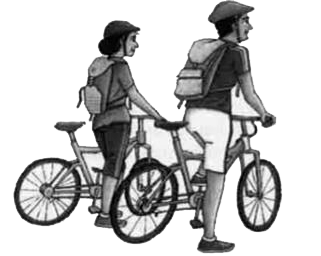
This 100km ride (approximately) is also one of the few routes in Uttarakhand that encapsulates all the element that one expects while cycling here — steep slopes, sharp curves, endless hills, lush forests, and off-road experiences.
(Source: By Vishav Driman, India Travel 360)
What is the meaning of the expression "when our peers were slowing down, relaxing and watching sunsets from their front porch" and in what context has the author used this?View SolutionRead the passage given below and answer the questions that follow.
Vishav Driman (65 year old) and her husband Kamal Jeet (69 year old) set out to discover the hidden treasure of Uttarakhand by bicycle. Vishav shares their post-retirement adventure.
Pedalling through the Golden Years
Ala lime when our peers were Slowing down, relaxing and watching sunsets from their front porch, we found a new passion — cycling. We started out with short daily rides, but found ourselves looking forward to them more and more, so much that we decided to venture further and cover more ground. There were obvious health concerns — the risk of performing a physically strenuous activity at a high altitude, the most obvious of them. But it helped that we had lived in Uttarakhand's capital, Dehradun, our entire lives, and were therefore acclimatised to the cold winds and narrow winding roads that characterise this beautiful state. We were also familiar with almost all the scenic mountain trails it had to offer. Short rides extended to longer ones as we started falling deeper in love with not just the sport, but the very idea of discovering a world we had always been a pait of, but never had the time to exploie. Soon, a simple hobby turned into a project of sorts, and we started participating in cyclotrons and other cycling events being held in the city. Admiration and encouragement poured in from family members, friends and neighbours along the way, sparking a new thought — was it possible to travel across the state on our bicycles? It seemed daunting at first, but we knew we had to try. Our gear in place, our bikes serviced, and our minds set, we set off on an adventure we would remember for the rest of our lives.

In my opinion, there are very few ways to enjoy and appreciate the beauty of Uttarakhand and cycling is the most thrilling of them all. Sunlight filtering through the trees and a cool breeze gently caressing your faces as you ride, coupled with breathtaking views of sal forests spread like a green cover on the mountains and surrounding valleys, the experience of pedalling across the state is truly inexplicable. Of the many trails we navigated, there is one that occupies a special place in our hearts. It began from Ghanta Ghar, a popular tourist attraction in Dehradun, it took us through some of the most picturesque locations of the state such as Kimadi, Hathi Paon, Mussoorie and Chaar Dukaan, right up to George Everest point.
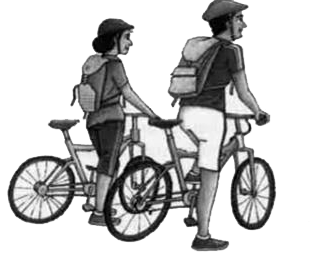
This 100km ride (approximately) is also one of the few routes in Uttarakhand that encapsulates all the element that one expects while cycling here — steep slopes, sharp curves, endless hills, lush forests, and off-road experiences.
(Source: By Vishav Driman, India Travel 360)
What was the strong passion that prompted the retired couple to take up this adventurous journey?View Solution
Knowledge Check
- Question 1 - Select One
Comprehension:
Read the passage and answer the questions that follow.
My grandmother and I were good friend. My parents left me with they went to live in the city and we were contantly together. She used to wake me up in the morning and get me ready for school. She said her morning prayer in a monotonous sing song while she bathed and dressed me in the hope that I would listen and get to know it by heart, I listened because I loved her voice but never bothered to learn it. Then she would fetch my wooden slate which she had already washed and plastered with yellow chalk, a tiny earthen inkpot and a red pen, tie them all in a bundle and hand it to me. After a breakfast of a thick, stale chapatti with a little butter and sugar spread on it, we went to school. She carried several stale chapattis with her for the village dogs. My grandmother always went to school with me because the school was attached to the temple. The priest taught us the alphabet and the morning prayer. While the children sat in rows on either side of the verandah singing the alphabet or the prayer in a chorus, my grandmother sat inside reading the scriptures. When we had both finished, we would walk back together. This time the village dogs would meet us at the temple door. They followed us to our home growling and fighting with each other for the chapattis we threw to them. When my parents were comfortably settled in the city, they sent for us. That was a turning point in our friendship. Although we shared the same room, my grandmother no longer came to school with me. I used to go to an English school in a motor bus. There were no dogs in the streets and she took to feeding sparrows in the courtyard of our city house. As the years rolled by we saw less of each other. For some time she continued to wake me up and get me ready for school. When I came back she would ask me what the teacher had taught me. I would tell her English words and little things of western science and learning, the law of gravity, Archimedes' Principle, the world being round, etc. This made her unhappy. She could not help me with my lessons. She did not believe in the things they taught at the English school and was distressed that there was no teaching about God and the scriptures.
SubQuestion No : 41
Why did grandmother carry stale chapattis with her?ATo feed the stray dogsBTo serve as her lunchCTo feed her grandsonDTo give away to poor people - Question 2 - Select One
Comprehension:
Read the passage and answer the questions that follow.
My grandmother and I were good friends. My parents left me when they went to live in the city and we were constantly together. She used to wake me up in the morning and get me ready for school. She said her morning prayer in a monotonous sing song while she bathed and dressed me in the hope that I would listen and get to know it by heart, I listened because I loved her voice but never bothered to learn it. Then she would fetch my wooden slate which she had already washed and plastered with yellow chalk, a tiny earthen inkpot and a red pen, tie them all in a bundle and hand it to me. After a breakfast of a thick, stale chapatti with a little butter and sugar spread on it, we went to school. She carried several stale chapattis with her for the village dogs. My grandmother always went to school with me because the school was attached to the temple. The priest taught us the alphabet and the morning prayer. While the children sat in rows on either side of the verandah singing the alphabet or the prayer in a chorus, my grandmother sat inside reading the scriptures. When we had both finished, we would walk back together.
Question:
Why did grandmother accompany her grandson to school every day?ATo keep him safe from stray dogsBTo read scriptures in the temple while he studiedCTo spend more time with himDTo ensure he would't run away to play in the streets - Question 3 - Select One
Comprehension:
Read the passage and answer the questions that follow.
My grandmother and I were good friend. My parents left me with they went to live in the city and we were contantly together. She used to wake me up in the morning and get me ready for school. She said her morning prayer in a monotonous sing song while she bathed and dressed me in the hope that I would listen and get to know it by heart, I listened because I loved her voice but never bothered to learn it. Then she would fetch my wooden slate which she had already washed and plastered with yellow chalk, a tiny earthen inkpot and a red pen, tie them all in a bundle and hand it to me. After a breakfast of a thick, stale chapatti with a little butter and sugar spread on it, we went to school. She carried several stale chapattis with her for the village dogs. My grandmother always went to school with me because the school was attached to the temple. The priest taught us the alphabet and the morning prayer. While the children sat in rows on either side of the verandah singing the alphabet or the prayer in a chorus, my grandmother sat inside reading the scriptures. When we had both finished, we would walk back together. This time the village dogs would meet us at the temple door. They followed us to our home growling and fighting with each other for the chapattis we threw to them. When my parents were comfortably settled in the city, they sent for us. That was a turning point in our friendship. Although we shared the same room, my grandmother no longer came to school with me. I used to go to an English school in a motor bus. There were no dogs in the streets and she took to feeding sparrows in the courtyard of our city house. As the years rolled by we saw less of each other. For some time she continued to wake me up and get me ready for school. When I came back she would ask me what the teacher had taught me. I would tell her English words and little things of western science and learning, the law of gravity, Archimedes' Principle, the world being round, etc. This made her unhappy. She could not help me with my lessons. She did not believe in the things they taught at the English school and was distressed that there was no teaching about God and the scriptures.
SubQuestion No : 42
grandmother sang the morning prayer in a monotonous tone so that:Aher melodious voice echoed in the houseBher grandson would learn it tooCher grandson would wake up with soundDher childern would return home soon
Read the passage given below and answer the questions that follow.
Vishav Driman (65 year old) and her husband Kamal Jeet (69 year old) set out to discover the hidden treasure of Uttarakhand by bicycle. Vishav shares their post-retirement adventure.
Pedalling through the Golden Years
Ala lime when our peers were Slowing down, relaxing and watching sunsets from their front porch, we found a new passion — cycling. We started out with short daily rides, but found ourselves looking forward to them more and more, so much that we decided to venture further and cover more ground. There were obvious health concerns — the risk of performing a physically strenuous activity at a high altitude, the most obvious of them. But it helped that we had lived in Uttarakhand's capital, Dehradun, our entire lives, and were therefore acclimatised to the cold winds and narrow winding roads that characterise this beautiful state. We were also familiar with almost all the scenic mountain trails it had to offer. Short rides extended to longer ones as we started falling deeper in love with not just the sport, but the very idea of discovering a world we had always been a pait of, but never had the time to exploie. Soon, a simple hobby turned into a project of sorts, and we started participating in cyclotrons and other cycling events being held in the city. Admiration and encouragement poured in from family members, friends and neighbours along the way, sparking a new thought — was it possible to travel across the state on our bicycles? It seemed daunting at first, but we knew we had to try. Our gear in place, our bikes serviced, and our minds set, we set off on an adventure we would remember for the rest of our lives.

In my opinion, there are very few ways to enjoy and appreciate the beauty of Uttarakhand and cycling is the most thrilling of them all. Sunlight filtering through the trees and a cool breeze gently caressing your faces as you ride, coupled with breathtaking views of sal forests spread like a green cover on the mountains and surrounding valleys, the experience of pedalling across the state is truly inexplicable. Of the many trails we navigated, there is one that occupies a special place in our hearts. It began from Ghanta Ghar, a popular tourist attraction in Dehradun, it took us through some of the most picturesque locations of the state such as Kimadi, Hathi Paon, Mussoorie and Chaar Dukaan, right up to George Everest point.
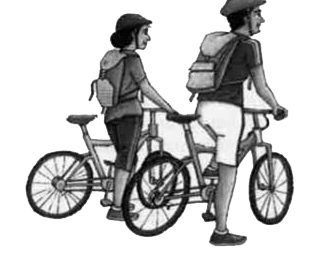
This 100km ride (approximately) is also one of the few routes in Uttarakhand that encapsulates all the element that one expects while cycling here — steep slopes, sharp curves, endless hills, lush forests, and off-road experiences.
(Source: By Vishav Driman, India Travel 360)
What are the expectations of a cyclist from such an adventurous trip through the mountains? Did Vishav and Kamal Jeet get these experiences from Lhe 100 km ride?View SolutionRead the passage given below and answer the questions that follow.
Vishav Driman (65 year old) and her husband Kamal Jeet (69 year old) set out to discover the hidden treasure of Uttarakhand by bicycle. Vishav shares their post-retirement adventure.
Pedalling through the Golden Years
Ala lime when our peers were Slowing down, relaxing and watching sunsets from their front porch, we found a new passion — cycling. We started out with short daily rides, but found ourselves looking forward to them more and more, so much that we decided to venture further and cover more ground. There were obvious health concerns — the risk of performing a physically strenuous activity at a high altitude, the most obvious of them. But it helped that we had lived in Uttarakhand's capital, Dehradun, our entire lives, and were therefore acclimatised to the cold winds and narrow winding roads that characterise this beautiful state. We were also familiar with almost all the scenic mountain trails it had to offer. Short rides extended to longer ones as we started falling deeper in love with not just the sport, but the very idea of discovering a world we had always been a pait of, but never had the time to exploie. Soon, a simple hobby turned into a project of sorts, and we started participating in cyclotrons and other cycling events being held in the city. Admiration and encouragement poured in from family members, friends and neighbours along the way, sparking a new thought — was it possible to travel across the state on our bicycles? It seemed daunting at first, but we knew we had to try. Our gear in place, our bikes serviced, and our minds set, we set off on an adventure we would remember for the rest of our lives.

In my opinion, there are very few ways to enjoy and appreciate the beauty of Uttarakhand and cycling is the most thrilling of them all. Sunlight filtering through the trees and a cool breeze gently caressing your faces as you ride, coupled with breathtaking views of sal forests spread like a green cover on the mountains and surrounding valleys, the experience of pedalling across the state is truly inexplicable. Of the many trails we navigated, there is one that occupies a special place in our hearts. It began from Ghanta Ghar, a popular tourist attraction in Dehradun, it took us through some of the most picturesque locations of the state such as Kimadi, Hathi Paon, Mussoorie and Chaar Dukaan, right up to George Everest point.
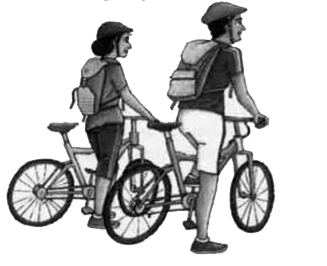
This 100km ride (approximately) is also one of the few routes in Uttarakhand that encapsulates all the element that one expects while cycling here — steep slopes, sharp curves, endless hills, lush forests, and off-road experiences.
(Source: By Vishav Driman, India Travel 360)
What made Vishav and her husband confident to venture into Uttarakhand on their bicycles?View SolutionRead the passage given below and answer the questions that follow.
Vishav Driman (65 year old) and her husband Kamal Jeet (69 year old) set out to discover the hidden treasure of Uttarakhand by bicycle. Vishav shares their post-retirement adventure.
Pedalling through the Golden Years
Ala lime when our peers were Slowing down, relaxing and watching sunsets from their front porch, we found a new passion — cycling. We started out with short daily rides, but found ourselves looking forward to them more and more, so much that we decided to venture further and cover more ground. There were obvious health concerns — the risk of performing a physically strenuous activity at a high altitude, the most obvious of them. But it helped that we had lived in Uttarakhand's capital, Dehradun, our entire lives, and were therefore acclimatised to the cold winds and narrow winding roads that characterise this beautiful state. We were also familiar with almost all the scenic mountain trails it had to offer. Short rides extended to longer ones as we started falling deeper in love with not just the sport, but the very idea of discovering a world we had always been a pait of, but never had the time to exploie. Soon, a simple hobby turned into a project of sorts, and we started participating in cyclotrons and other cycling events being held in the city. Admiration and encouragement poured in from family members, friends and neighbours along the way, sparking a new thought — was it possible to travel across the state on our bicycles? It seemed daunting at first, but we knew we had to try. Our gear in place, our bikes serviced, and our minds set, we set off on an adventure we would remember for the rest of our lives.

In my opinion, there are very few ways to enjoy and appreciate the beauty of Uttarakhand and cycling is the most thrilling of them all. Sunlight filtering through the trees and a cool breeze gently caressing your faces as you ride, coupled with breathtaking views of sal forests spread like a green cover on the mountains and surrounding valleys, the experience of pedalling across the state is truly inexplicable. Of the many trails we navigated, there is one that occupies a special place in our hearts. It began from Ghanta Ghar, a popular tourist attraction in Dehradun, it took us through some of the most picturesque locations of the state such as Kimadi, Hathi Paon, Mussoorie and Chaar Dukaan, right up to George Everest point.
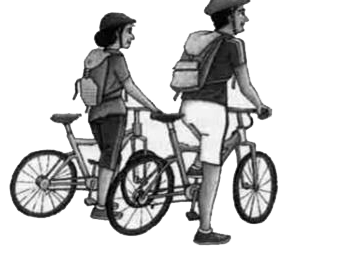
This 100km ride (approximately) is also one of the few routes in Uttarakhand that encapsulates all the element that one expects while cycling here — steep slopes, sharp curves, endless hills, lush forests, and off-road experiences.
(Source: By Vishav Driman, India Travel 360)
Which trail occupies a special place in the couple's heart?View SolutionComprehension:
Read the passage and answer the questions that follow.
My grandmother and I were good friend. My parents left me with they went to live in the city and we were contantly together. She used to wake me up in the morning and get me ready for school. She said her morning prayer in a monotonous sing song while she bathed and dressed me in the hope that I would listen and get to know it by heart, I listened because I loved her voice but never bothered to learn it. Then she would fetch my wooden slate which she had already washed and plastered with yellow chalk, a tiny earthen inkpot and a red pen, tie them all in a bundle and hand it to me. After a breakfast of a thick, stale chapatti with a little butter and sugar spread on it, we went to school. She carried several stale chapattis with her for the village dogs. My grandmother always went to school with me because the school was attached to the temple. The priest taught us the alphabet and the morning prayer. While the children sat in rows on either side of the verandah singing the alphabet or the prayer in a chorus, my grandmother sat inside reading the scriptures. When we had both finished, we would walk back together. This time the village dogs would meet us at the temple door. They followed us to our home growling and fighting with each other for the chapattis we threw to them. When my parents were comfortably settled in the city, they sent for us. That was a turning point in our friendship. Although we shared the same room, my grandmother no longer came to school with me. I used to go to an English school in a motor bus. There were no dogs in the streets and she took to feeding sparrows in the courtyard of our city house. As the years rolled by we saw less of each other. For some time she continued to wake me up and get me ready for school. When I came back she would ask me what the teacher had taught me. I would tell her English words and little things of western science and learning, the law of gravity, Archimedes' Principle, the world being round, etc. This made her unhappy. She could not help me with my lessons. She did not believe in the things they taught at the English school and was distressed that there was no teaching about God and the scriptures.
SubQuestion No : 44
What kind of woman was the grandmother?View SolutionComprehension:
Read the passage and answer the questions that follow.
My grandmother and I were good friend. My parents left me with they went to live in the city and we were contantly together. She used to wake me up in the morning and get me ready for school. She said her morning prayer in a monotonous sing song while she bathed and dressed me in the hope that I would listen and get to know it by heart, I listened because I loved her voice but never bothered to learn it. Then she would fetch my wooden slate which she had already washed and plastered with yellow chalk, a tiny earthen inkpot and a red pen, tie them all in a bundle and hand it to me. After a breakfast of a thick, stale chapatti with a little butter and sugar spread on it, we went to school. She carried several stale chapattis with her for the village dogs. My grandmother always went to school with me because the school was attached to the temple. The priest taught us the alphabet and the morning prayer. While the children sat in rows on either side of the verandah singing the alphabet or the prayer in a chorus, my grandmother sat inside reading the scriptures. When we had both finished, we would walk back together. This time the village dogs would meet us at the temple door. They followed us to our home growling and fighting with each other for the chapattis we threw to them. When my parents were comfortably settled in the city, they sent for us. That was a turning point in our friendship. Although we shared the same room, my grandmother no longer came to school with me. I used to go to an English school in a motor bus. There were no dogs in the streets and she took to feeding sparrows in the courtyard of our city house. As the years rolled by we saw less of each other. For some time she continued to wake me up and get me ready for school. When I came back she would ask me what the teacher had taught me. I would tell her English words and little things of western science and learning, the law of gravity, Archimedes' Principle, the world being round, etc. This made her unhappy. She could not help me with my lessons. She did not believe in the things they taught at the English school and was distressed that there was no teaching about God and the scriptures.
SubQuestion No : 45
What does the narrator refer to as the 'turning point'?View Solution

